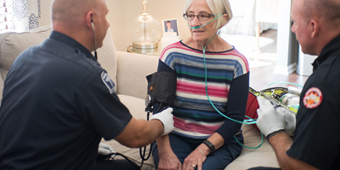Living With Mitral Valve Prolapse

Answer a few questions and we'll provide you with a list of primary care providers that best fit your needs.
Most people with the heart condition called mitral valve prolapse don’t even know they have it. In most cases it’s harmless, but in rare instances may require treatment. Knowing the symptoms can help prevent serious complications.
What Is Mitral Valve Prolapse?
The mitral valve allows blood to flow between the upper left atrium and lower left ventricle of the heart. When the flaps of the valve don’t fully close, they may push into the left atrium. This can cause a murmur that can be detected with a stethoscope.
The cause of mitral valve prolapse is unknown, but the condition tends to run in families. About 2 percent of Americans have the condition, says the American Heart Association.
You are at increased risk for developing mitral valve prolapse if you have:
- Connective tissue disorders such as Marfan syndrome
- Graves disease, an overactive thyroid gland, or hyperthyroidism
- Scoliosis, curvature of the spine
- Certain types of muscular dystrophy
Mitral valve prolapse occurs when the flaps of the mitral valve are floppy or fail to form a tight seal. This can lead to complications such as:
- Palpitations, the feeling of your heartbeat racing, pounding, skipping, or fluttering
- Arrhythmias, conditions in which the heart goes out of rhythm
- Atrial fibrillation, an arrhythmia that causes rapid, irregular beating or quivering of the heart's upper chambers. This may result in blood pooling and clotting inside the heart, raising the risk for heart attack and stroke.
- Regurgitation, which is the backward flow of blood into the left atrium
If blood leaks through the valve, infection and other serious complications such as blood clots, stroke, and heart attack can result.
The cause of mitral valve prolapse is unknown, but the condition tends to run in families. About 2 percent of Americans have the condition.
Symptoms Of Mitral Valve Prolapse
Most people with mitral valve prolapse have no symptoms, and their heart is not damaged. The condition can be present at birth or can develop later in life.
For some people, the flaps of the mitral valve stretch out over time and symptoms may appear or worsen. In some cases, blood flows backward, requiring the heart to pump it twice. That means your heart has to work harder.
Common symptoms include:
- Mild chest pain
- A racing heartbeat (palpitations)
- Cough
- Headache
- Dizziness
- Shortness of breath when lying down
- Trouble breathing with activity
The symptoms of mitral valve prolapse can be similar to other medical conditions. If you experience any of these signs or changes in your heart rhythm, talk with your doctor right away.
How Mitral Valve Problems Are Diagnosed

To diagnose mitral valve prolapse, your doctor will talk with you about your medical history and perform a physical exam.
Depending on your symptoms, your doctor may use any of several diagnostic tests, which can include:
- Electrocardiogram (ECG). This test checks the electrical activity of your heart to detect abnormal rhythms and heart muscle damage.
- Chest X-ray. Imaging can check your lungs and see if your heart is enlarged.
- Echocardiogram (Echo). Ultrasound uses sounds waves to create pictures of the chambers and valves of the heart.
- Stress test. An ECG is performed while you walk on a treadmill, to monitor the heart during exercise.
- Vascular tests, such as:
- Cardiac catheterization. A contrast dye is injected into an artery and X-rays are taken to check for blockages.
- Cardiac magnetic resonance imaging (MRI). Detailed images of the heart are taken to make a diagnosis or to prepare for heart valve surgery.
The extent of your symptoms and the severity of your mitral valve prolapse will help your doctor choose the best treatment options for you.
Treatments Reduce Symptoms, Avoid Complications
Treatments for mitral valve prolapse focus on reducing symptoms and repairing abnormal mitral valve flaps to prevent further heart damage and more serious conditions.
Options include:
- Medical monitoring. Regular check-ups to monitor your heart to make sure the valve is not weakening.
- Medicines. If your doctor prescribes medicines to treat your mitral valve prolapse, you should take them as directed and avoid stimulants such as caffeine and cigarettes. Medicines can be used
to:
- Control irregular or fast heartbeats
- Strengthen your heartbeat
- Prevent blood clots (blood thinners) if atrial fibrillation or severe left atrium enlargement is present
- Reduce how hard your heart must work
- Remove excess fluid in your body (diuretic)
- Surgery. Surgical procedures to repair or replace leaky valves and stop the backflow of blood may be required if:
- Your symptoms are getting worse
- Your heart is enlarged
Most people with mitral valve prolapse can lead active, long lives. It is important to receive ongoing medical care to monitor your condition, to follow a heart healthy diet and get regular exercise. If symptoms appear or worsen, they can usually be controlled with medicines.
Answer a few questions and we'll provide you with a list of primary care providers that best fit your needs.
Source: National Heart, Lung and Blood Institute; American Heart Association




